|
Part I: France v Belgium - Part II: Time-Wasting Report Card
A few days ago, I wrote that France closed out Belgium with a master class in wasting time. I appreciate all the views it received and Twitter dialogue it's generated, much of which has seemingly come from the two countries involved in the match. Many great questions arose – namely how France's time-wasting in Tuesday's semifinal actually stacks up relative to other such performances in this World Cup and beyond.
That is a question I absolutely wanted to explore, and I'd certainly have done it sooner if I could wave a magic wand and have the start-stop-and-cause data for every match at my fingertips. But in reality, it requires that I re-watch the end of every match. (Maybe there's some algorithm out there that can do it, though I'd argue you sometimes need human judgment to determine the primary cause of certain delays.) In any case, I went ahead and conducted the same "time-wasting" analysis for five additional matches from the 2018 FIFA World Cup knockout stage. I specifically focused on matches with a one-goal margin for all or nearly all of the 71st minute through the end of stoppage time, which mirrors the situation in France v. Belgium and is the most likely circumstance in which the side with the lead will waste time. So the sample now includes France v. Belgium (1-0, Semifinal); Brazil v. Mexico (2-0, Round of 16); Belgium v. Brazil (2-1, Quarterfinal); Uruguay v. Portugal (2-1, Round of 16); Sweden v. Switzerland (1-0, Round of 16); and England v. Colombia (1-1, Round of 16). Brazil had a one-goal lead from the 51st to the 88th minute, and England had a one-goal lead from the 57th minute to the 93rd minute, so both of those qualified. You can scroll down to see the play-by-play details for all six matches. The headline is that France did indeed waste time best (most) among World Cup teams with a one-goal lead in this year's knockout stage. Brazil was not far behind in their defeat of Mexico. Given the differences in stoppage time, the best measurement to lean on is percentage of the match after the 70th minute squandered by each side:
As we observed in the original story, France wasted 12 minutes and five seconds of the final 26 minutes and 13 seconds of their semifinal with Belgium, which represented 46% of all match time after the 70th minute. Brazil wasted 11:30 of the final 26:07 with Mexico, accounting for 44% of remaining time. Belgium milked some clock in their 2-1 quarterfinal victory too, but not nearly to the level of France and Brazil.
Brazil wasted time almost as well as France
Brazil-Mexico's final stretch was an entertaining re-watch – depending, of course, on what your definition of entertaining is. I fast-forwarded as always to the 70:00 mark, and sure enough, play had already been interrupted by an injury to Brazil's Willian back at 69:16. The action didn't resume until 70:16. (For purposes of this analysis, I only counted the 16 seconds of stoppage that occurred from the 70:00 point onward.) Five seconds later (!!!!!), Neymar was writhing on the sideline in one of his finest performances of the World Cup. (I guess Miguel Layún stepped on him. You saw the GIFs and memes. You be the judge.) That resulted in a two-minute-and-two-second delay. Three-and-a-half minutes after that, he was back on the ground for a 48-second delay. Keeping track? That's 3:50 worth of Brazilian injuries in a span of 6:46. As if to one-up Neymar, Brazil's Thiago Silva took 1:45 off the clock with an injury that started at 81:47. Play resumed at 83:32, and for all his agony, Silva was back on the pitch 10 seconds later. In the period studied, Brazil burned 5:35 on injuries, 2:12 on subs, and 1:17 after a goal. That's 9:04 in wasted time after 69:17 alone. Surely there was more wasted in the half. Yet there were only six minutes of stoppage time. Four of Mexico's five fouls after the 70th minute sent a Brazilian player to the ground in histrionics. The only one that didn't came after Brazil secured a two-goal lead in the 88th. Yet somehow, when Brazil was trailing Belgium by a goal late in the next match, the Seleção avoided injury altogether. Brazil wasted only 2:34 after the 70th minute of that match – about one-fifth the amount they wasted against Mexico.
Everybody does it when they're winning (albeit to different degrees)
The winning side wasted more time than the losing side in all six of the knockout stage matches that carried a one-goal margin for all or nearly all of the end of regulation. France and Brazil fared comically best, followed by Belgium, and then Uruguay, Sweden and England. (England conceded a 93rd-minute goal to Colombia, so maybe they should have taken a time-wasting page from France and Brazil.) There's a ton of detail below, but I wanted to share it all because different folks will find different parts interesting. You'll note that winning teams were responsible for 71% of all time wasted after the 70th minute in these six matches. They were injured 11 times for a total of 13:59 (average of 1:16), whereas the trailing side was injured just once for a mere 22 seconds (Switzerland in the 75th minute against Sweden.) The winning side delayed the match with a sub nine times for a total of 8:53 (average of 0:59), while the losing team did so only twice for 1:19 (average of 0:39). (That doesn't mean losing sides didn't make subs after the 70th minute; it just means that when they did, there was another factor equal or greater causing the match delay.) Teams with the lead took twice as long on free kicks (31 seconds versus 15), and they took three times as long on goal kicks (31 seconds versus 11) and throw-ins (17 seconds versus six). [Again, the data below only counts the primary cause of delay. Injuries and substitutions generally take longer than whatever precipitated them, so they supersede the other acts listed. If a sub were made during a goal kick, for example, it's counted in the sub category, not as a goal kick. If an injury occurred to draw a free kick, it's counted in the injury category and won't show up in the free kick data. So for the most part, you can trust the corner, free kick, goal kick, and throw-in times as not elongated by other factors.]
Detail for each of the six matches
Match flow can affect the degree to which a team has the opportunity to waste time. In the Round of 16, Switzerland trailed Sweden 1-0 from the 66th minute onward. But the Swiss maintained pressure and won six corners in the final 20 minutes plus stoppage time alone, losing 2:34 to a worthy but ultimately futile cause. (No other team in these six matches won more than two corners during that final run of the match.) The Swiss attack led to only two Swedish goal kicks, giving the Swedes less chance to burn clock. These charts are sorted by how much time the winning side wasted after the 70th minute. If you scroll all the way down to England v. Colombia, you'll see that I highlighted a continuous in-play stretch of three minutes and 31 seconds, from 74:18 to 77:39. That was by far the longest uninterrupted run of the periods studied in these six games. The next-highest was 1:41, during stoppage time of Sweden v. Switzerland. The average continuous play was 29 seconds – followed by, on average, 29 seconds of stoppage or delay.
Times presented represent best estimates based on analysis of Fox Sports TV coverage. Three moments are asterisked because the camera cut away from the field. Other reasonable analyses might arrive at slightly different time estimates. Data was compiled and analyzed by ELDORADO. All charts and graphs herein were created by ELDORADO.
1 Comment
barbieaux
7/15/2018 10:22:31 pm
Avez vous des statistiques sur l utilisation du VAR, il y a une suspicion certains pays ont été épargner
Reply
Leave a Reply. |
|
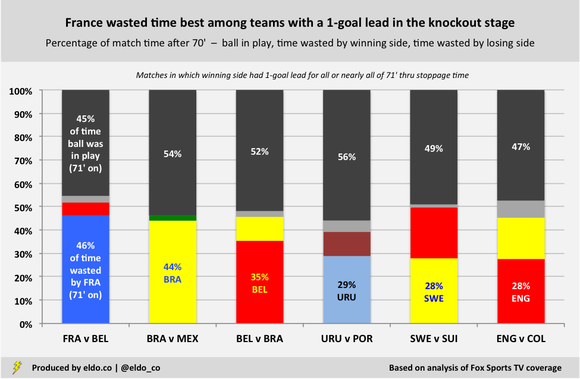
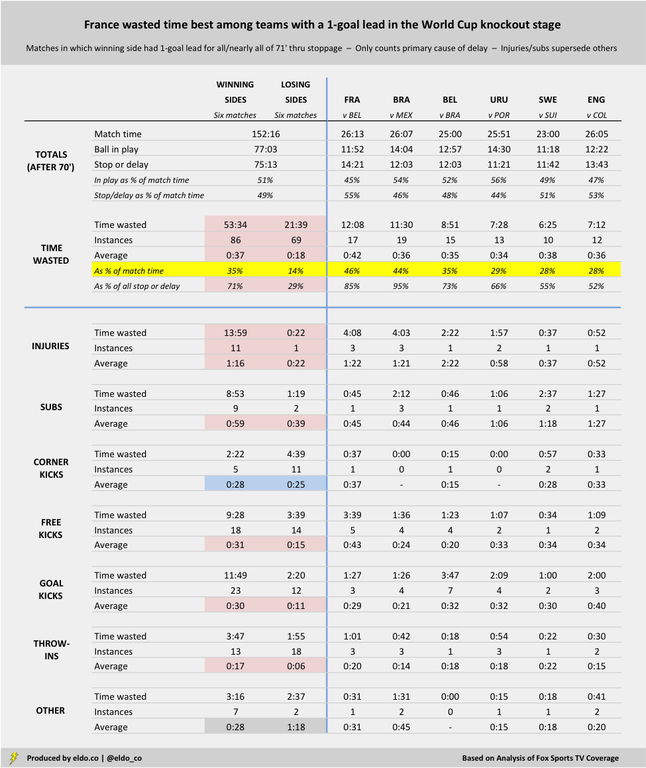
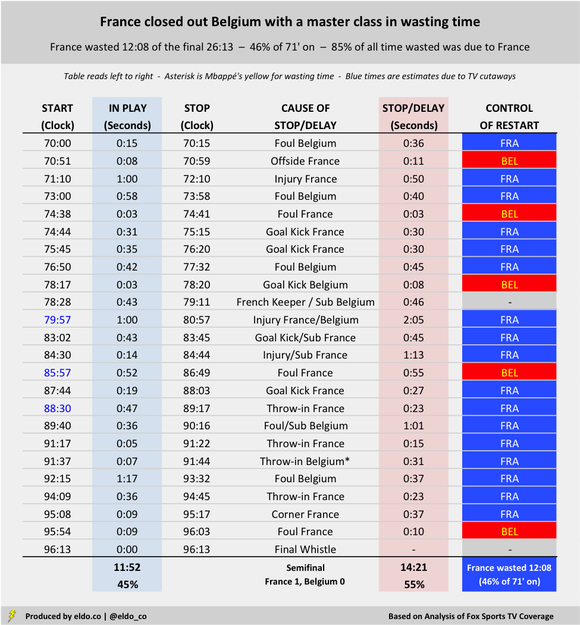
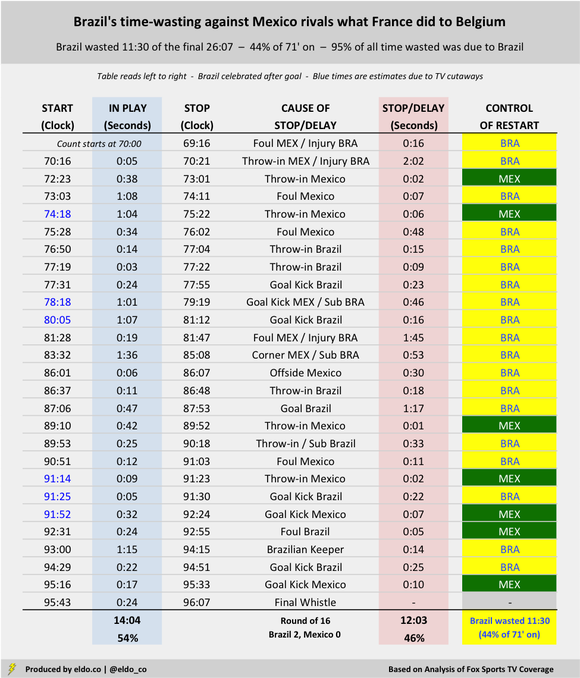
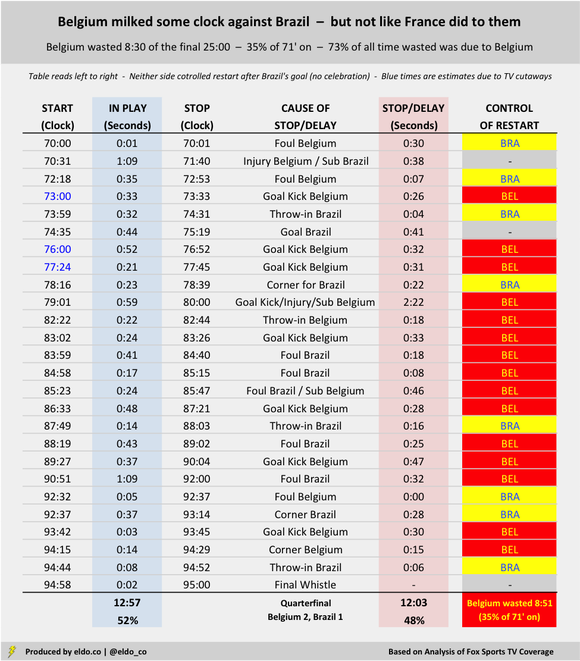
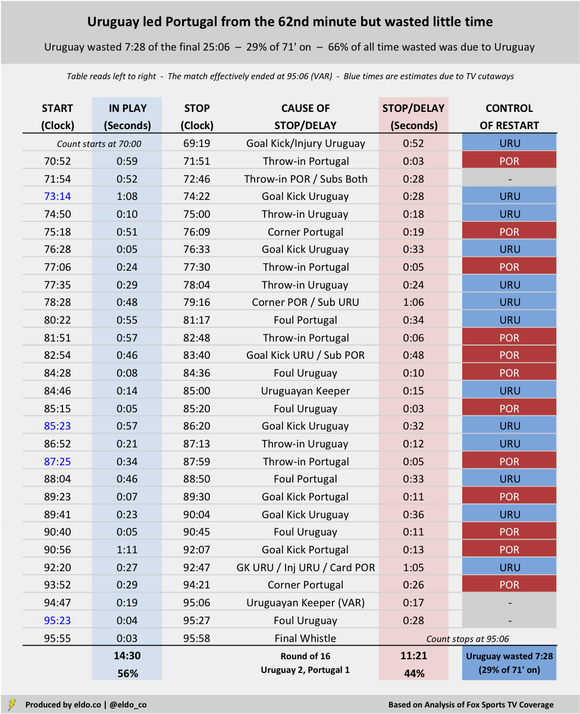
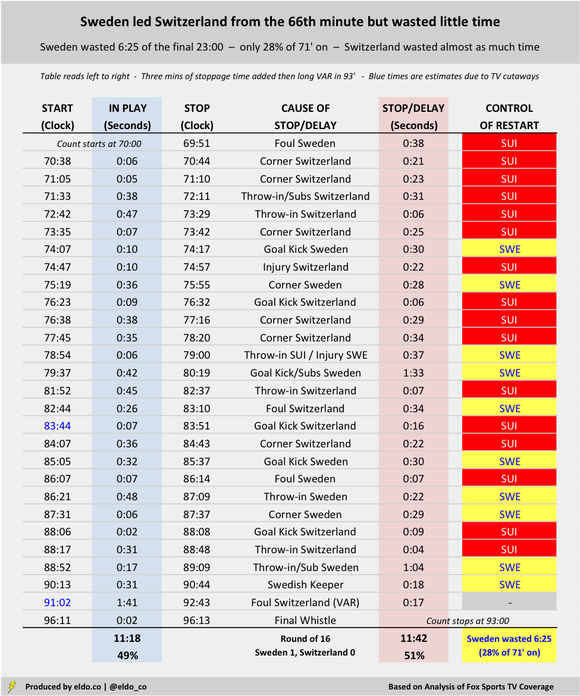
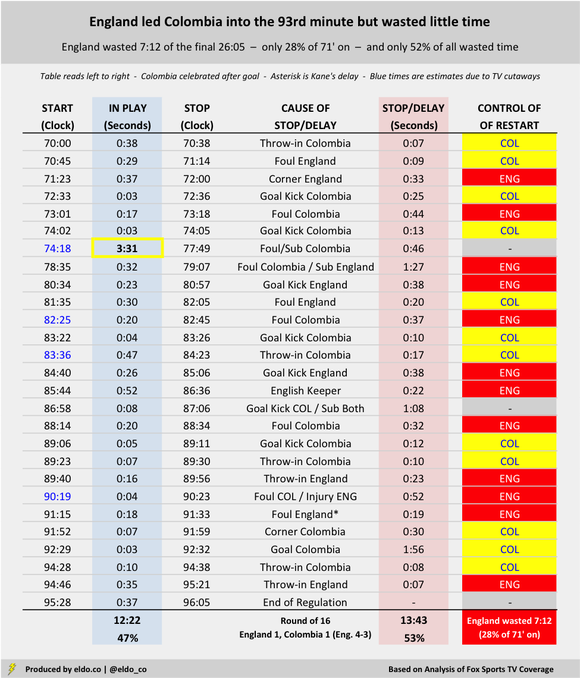

 RSS Feed
RSS Feed